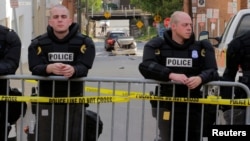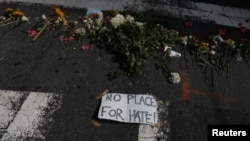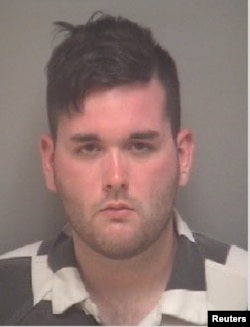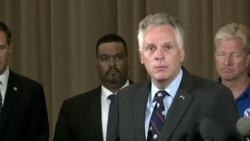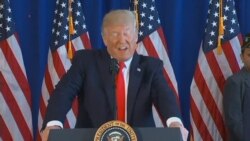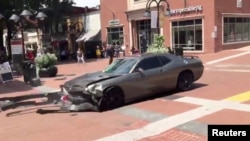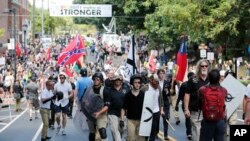The victims were remembered at a vigil Sunday in Charlottesville, while people in multiple cities across the U.S. gathered to protest the violence and criticize Donald Trump's response for not explicitly condemning far-right groups.
In New York, marchers gathered at Trump Tower to voice their displeasure, while hundreds of people rallied against white nationalist groups in Los Angeles.About 1,000 people gathered at another anti-hate rally in Denver.
A Seattle rally planned by a conservative pro-Trump group before the events in Charlottesville was met by counter-protesters, and police used pepper spray to break up crowds after fireworks were thrown at officers.
The White House defended Trump's reaction in a statement released Sunday saying the president "condemns all forms of violence, bigotry and hatred and of course that includes white Supremacists, KKK, neo-Nazi and all extremist groups. He called for national unity and bringing all Americans together.''
The White House did not attach a name to the statement. Usually, it would be signed by the press secretary or another staffer.
In Pictures: Rallies in Aftermath of Charlottesville Deadly Violence
Vice President Mike Pence defended Trump during a visit to Colombia on Sunday.
"President Trump clearly and unambiguously condemned the bigotry, violence, and hatred which took place on the streets of Charlottesville," Pence said."We have no tolerance for hate and violence, from white supremacists, neo-Nazis, or the KKK."
The U.S. Justice Department opened a civil rights investigation into the day of violence at the "Unite the Right" rally where white nationalists, many of them supporters of President Trump, clashed with counter-protesters on the streets of the college town 160 kilometers southwest of Washington.
Rally organizer's press conference shut down
Jason Kessler, a prominent white nationalist who organized the rally, on Sunday blamed Charlottesville officials for failing to prevent the violence from occurring, but condemned it. But just as he said that city officials "violated" white nationalists' free speech rights by calling off the official rally, hundreds of shouting counter-protesters surrounded him.
Some people chanted and made noise with drums and other instruments. After a woman tackled him to the ground, Kessler asked police for help. Eventually they escorted him off. There were no arrests.
The streets of Charlottesville were quiet Sunday.Charlottesville Mayor Mike Signer told NBC the killing of Heyer was a "terrorist attack with a car used as a weapon."The car's driver, James Alex Fields Jr., from the midwestern state of Ohio, was arrested and charged with murder and other offenses. Fields has his first court appearance Monday.
Virginia Governor Terry McAuliffe visited two Charlottesville churches to talk about the violence, a day after he told the white nationalists, many of them from out of state, that they were not welcome in Virginia and to go home. He had declared a state of emergency on Saturday after fights broke out between armor-clad, shield-carrying white nationalist demonstrators gathered to protest the removal of a Confederate statue and similarly armed counter-protesters.
"I have a message to all the white supremacists and the Nazis who came into Charlottesville today. Our message is plain and simple: Go home," McAuliffe said at a news conference. "You are not wanted in this great commonwealth. Shame on you."
"The acts and rhetoric in Charlottesville over past 24 hours are unacceptable and must stop. A right to speech is not a right to violence," he tweeted.
He also said he spoke to Trump in the hours after the clashes and that he twice told the president "we have to stop this hateful speech, this rhetoric.'' He said he urged Trump "to come out stronger'' against the actions of white supremacists.
Hundreds from both sides were involved in Saturday's violence, throwing punches as well as water bottles and other items. Police used tear gas to separate participants, but critics said police did not move decisively to keep the protesting groups separate from each other to prevent the violence from spiraling.
Charlottesville is focus of white nationalist protests
Before the Saturday violence, torch-bearing white nationalists marched through the University of Virginia campus on Friday night and gathered around the statue of General Robert E. Lee, a Confederate Civil War hero.
The city voted in April to remove the statue, a move being taken by many U.S. cities against such Confederate memorials. Since then, Charlottesville has been a focus of white nationalist protests.
One demonstrator at Saturday's protest, who did not give his name, told VOA, "We want to keep the statue because we think that it is an important symbol of our heritage and our people. It is meaningful. Its meaning is implicitly connected to white people ... in preserving our heritage and preserving the white race, our white heroes. Robert E. Lee is one of those heroes."
In pictures: Charlottesville Rocked by White Nationalist Protests
Kasey Landrum, however, from the counter-protest group, said, "I am here because white nationalists, white supremacists, Nazis, whatever you call them, they are the same thing. They represent the structures of evil, which in this case is white supremacy and that is an assault on all of us ... Unless we stand up against that ... they are going to continue to harm us all."




